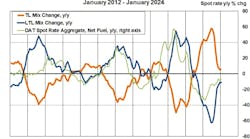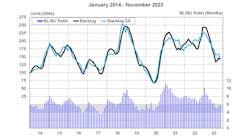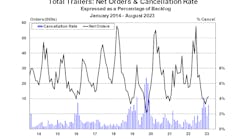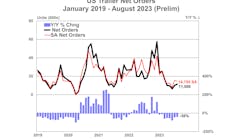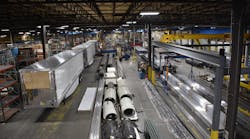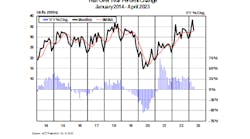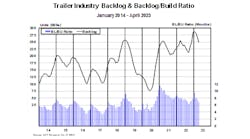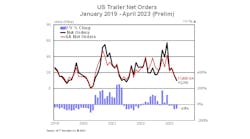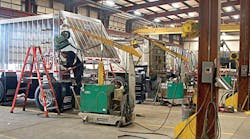Economic activity in the manufacturing sector expanded in September, and the overall economy grew for the 113th consecutive month, the nation’s supply executives said in the latest Manufacturing ISM Report On Business.
“Comments from the panel reflect continued expanding business strength,” said Timothy R. Fiore, chair of the ISM Business Survey. “Demand remains strong, with the New Orders Index at 60% or above for the 17th straight month, and the Customers’ Inventories Index remaining low. The Backlog of Orders Index continued to expand, but at lower levels compared to the previous month.
“Consumption improved, with production and employment continuing to expand, at higher levels compared to August, despite shortages in labor and materials.”
The September PMI registered 59.8%, a decrease of 1.5 percentage points from the August reading of 61.3%.
Other highlights from the report:
- The New Orders Index registered 61.8%, compared to the August reading of 65.1%.
- The Production Index registered 63.9%, compared to the August reading of 63.3%.
- The Employment Index registered 58.8%, compared to the August reading of 58.5%.
- The Supplier Deliveries Index registered 61.1%, compared to the August reading of 64.5%.
- The Inventories Index registered 53.3%, compared to the August reading of 55.4%.
- The Prices Index registered 66.9% in September, compared to the August reading of 72.1%, indicating higher raw materials prices for the 31st consecutive month.
Challenges remain, but overall conditions are improving, the report indicated.
“Inputs … improved compared to the previous month’s activity,” Fiore said. “But continued supply chain inefficiencies led to an increased consumption of inventory and a slight expansion of imports, which adequately supported production output. Lead-time extensions, steel and aluminum disruptions, supplier labor issues, and transportation difficulties continue to limit potential, but at more manageable levels.”
The machinery industry, along with transportation equipment and fabricated metal products, were among 15 industries reporting growth in September.
Here are some selected comments from respondents:
-- “The market is in a state of chaos with the latest round of tariffs. As an electronics original equipment manufacturer, our component prices have been impacted almost across the board. The tariffs have caused a mass rush to buy up inventories of affected products in order to minimize the long-term financial impact. This, in turn, is causing market constraints, which further drive up the cost and increase lead times.” (Computer & Electronic Products)
-- “Tariffs starting to take a bite out of profitability.” (Chemical Products)
-- “Business is strong and relatively stable. Tariffs are putting pressure on Chinese imports. Labor rates are increasing as it is very difficult to find help.” (Furniture & Related Products)
-- “The economy's strength is holding [and] outlook for the industry is positive, although continuing margin compression in consumer packaged goods is restricting general growth momentum from the greater economy.” (Food, Beverage & Tobacco Products)
-- “Still extremely strong through November; starting to see a decline for steel prices for December.” (Fabricated Metal Products)
-- “General available capacity at suppliers continues to decrease, creating supply issues.” (Machinery)
-- “Tariffs are creating a drag on some of our export opportunities.” (Plastics & Rubber Products)
-- “Sourcing hourly workers for remote locations continues to be a challenge for both full-time and part-time opportunities. Have implemented a wide variety of recruiting techniques and suppliers to aid us in sourcing this hard-to-find talent.” (Paper Products)
-- “Orders are coming in, but from a limited number of customers. The future looks very promising.” (Primary Metals)
-- “Suppliers are impacted by China tariffs, [which is] delaying or cancelling manufacturing transfer projects.” (Miscellaneous Manufacturing)
